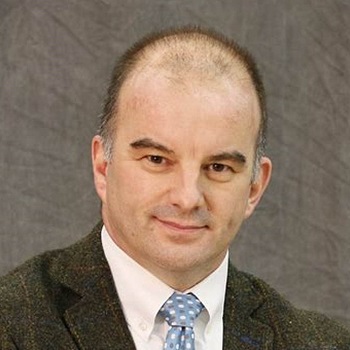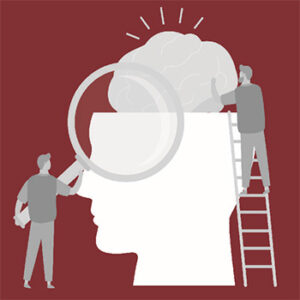Back to series



How We Got Where We Are Today
VOLUME 7 NUMBER 3 ISSUE OF BROADCAST TALKS (PDF)
BROADCAST TALKS presents ideas to cultivate Christ-like thinking and living. Each issue features a transcription of a talk presented at an event of The C. S. Lewis Institute. The following is adapted from a talk given by Carl Trueman on October 28, 2021, at a C.S. Lewis Institute livestream event titled Obsession with Self-Identity, Sexuality, and Rewriting History: How We Got Where We Are Today. The event was hosted by Joel Woodruff, President of the C.S. Lewis Institute.
|
It’s a great pleasure to be with you all this evening. As Joel articulated in his introductory comments, we live in a time of tremendous flux, chaos, and change, and I think part of that reality is that we cannot simply reduce its cause to one or two things. The reason why the world is in the state it’s in at the moment is the result of a variety, a vast number, of different factors. What I want to do is pull out some of what I consider to be the most salient points and hopefully give you some ideas for exploring the current cultural moment yourselves. At the heart of our modern problem, or our contemporary problem lies a way of imagining ourselves to be. What has occurred, I think, in the West in the last 200 to 300 years is that a new notion of the way we conceive of ourselves as human beings, as human persons, has come to dominate the popular, the cultural imagination. And the dramatic changes we see taking place in society around us at the moment are given a coherence or unity by being functions of or symptomatic of that underlying fundamental change. I want to talk about that this evening and then point to a number of ways in which that change has altered, for example, our understanding of institutions and our understanding of history and our understanding of some of the traditional rights that have, up until fairly recently, been considered obvious social goods and yet have, in recent years, been transformed into things that are regarded as part of the problem, not part of the solution. So I want to tell the story of the modern self, and then I want to work out the implications of that within the broader parameters of our culture. The Modern Self and Expressive IndividualismIf I could summarize the view of the modern self that I want to look at this evening, I would use the term expressive individualism. Expressive individualism is a term coined, I think, by Robert Bellah, the American sociologist, in the 1990s in his great book Habits of the Heart. Bellah defined the modern self in the following terms: Expressive individualism holds that each person has a unique core of feeling and intuition that should unfold or be expressed if individuality is to be realized. What Bellah’s saying is that the way we think about ourselves in modern society, the normative notion of the self, is one where our inner feelings are critical to our identity, critical to who we are; our ability to express those inner feelings is therefore essential to what we might dub as “social authenticity.”
Here’s an example. I use this example in my book [The Rise and Triumph of the Modern Self]. I draw a contrast between myself and my grandfather. I say, “If you’d asked my grandfather,”—he was a working-class, factory man, union member from the industrial heartland, the Midlands of England—if, as a sheet metal worker, he had job satisfaction, I think first of all he’d be confused by the question. The very idea of job satisfaction as we understand it in our contemporary world would have been an alien concept to him. But if we’d explained to him, “Do you find your work worthwhile?” I think his answer would have run along these lines: “Yeah, I find my work worthwhile because I get paid a fair day’s wage for an honest day’s work. I’m able to put shoes on my children’s feet and bread, meat, and potatoes on the family table. I’m able to meet my obligations to other people.” Now if you asked me the same question, “Trueman, do you get job satisfaction?” I’m intuitively going to respond in a somewhat different way. I’m likely to respond, “Yeah, I find teaching young people great! I love it when I’m in class, and there’s some back and forth when I’m trying to explain a complicated idea. Suddenly, I see light bulbs going on in students’ eyes as something they’ve not understood before becomes clear to them.” Notice the difference in our two answers there. My grandfather’s answer is very much connected to the obligations, the relationships of obligation that he has to other people. My answer is really grounded in the psychological satisfaction, the feeling that I get from doing the work I do. I might return now to the point I started the lecture with and say I’m an expressive individual. It’s my inner core of feelings that are the most important thing about me in a way that my grandfather was not. How he felt about his work, if that counted at all, only counted to the extent that it connected to the external obligations that he fulfilled to other people. My grandfather was who he was because he had a relationship of responsibility toward others. I am who I am because I feel in a certain way. Now when you think about that in terms of our contemporary social context, it has some fairly dramatic and extreme forms. Think of the trans movement which we’re facing, when somebody says, “I’m a woman trapped in a man’s body.” That would have been regarded by my grandfather, I think, as complete nonsense just twenty-five, thirty years ago. But now, of course, not only is it commonly accepted, it’s moving into the realms of a political and social orthodoxy to which one must conform, with which one must agree in order to be a member of civil society. But think about it. “I’m a woman trapped in a man’s body” prioritizes inner feelings and the ability to express those inner feelings outwardly as lying at the heart of what it means to be an authentic person. Perhaps in a less extreme example, we could think about . . . People describe themselves as “I’m lesbian” or “I’m gay”; “I’m bi” or “I’m straight.” Think about that. Those are identities rooted in desire, in inner desires. They’re not even rooted in action or activity. The parents whose child comes to them and says, “Dad, I think I’m gay,” know that the child may not be making a statement about any sexual activity in which they’ve engaged, but is making a statement really about the inner desire they feel. That we routinely now identify ourselves by our sexual desires again points to the importance, the priority, we now place on inner feelings, which Robert Bellah points to in his definition of expressive individualism. How Did This Come About and What Are the Implications?
Second, particularly I think in terms of the descriptors lesbian, gay, bisexual, straight, sexual desire has to have become decisive for identity. So the story we need to trace is one whereby we look at how external markers—bodies, relations of obligation and dependency, et cetera, things that have typically identified us—have come to have less authority than our inner feelings. And we need also to understand how those inner feelings have come to be identified with sexual desire. The Inward TurnThe first step is what we might call the inward turn. Again, go back to the Middle Ages. If you were living in the Middle Ages, and I’d say, “Who are you?” you would have identified yourself in terms of external relations. I’m a peasant farmer. I’m the son or daughter of so-and-so. I live in such-and-such a place. I belong to such-and-such a clan. You would have identified yourself. Your sense of self would have come from external realities. That all begins to shift for various reasons really in the sixteenth century with the Reformation. The emphasis upon justification by faith, for example. Placing an emphasis upon the individual’s responsibility to believe. The growth of cities and the breaking down of the old patterns of social organization mean that those external markers are being destabilized. There are all kinds of things going on in the sixteenth century that serve to weaken the externals of identity and to start pushing things toward the inside. This gets turbocharged, I think, in the eighteenth century, particularly the thought of Jean-Jacques Rousseau, interesting self-taught genius Genevan philosopher. Rousseau is the man who famously declared that man is born free but everywhere is in chains. What Rousseau does is argue—I suppose in his day it would have been counter intuitive—argue that it’s culture that messes people up, that we are born in a relatively pristine state. It’s as we enter into society, as we form relationships with other people, that we become corrupted. We have to start performing in certain ways to be accepted by society. We become envious and jealous of each other. We start to compete. We start to suppress our inner feelings in order to get on and belong. Rousseau is the great theorist of that. And Rousseau’s thinking receives remarkable and plausible artistic and cultural expression in the work of the Romantics. Romanticism is an artistic movement really beginning around the middle of the eighteenth century with figures such as the Scottish poet Robert Burns and flourishing in the latter part of the eighteenth, early nineteenth centuries, associated with figures such as Schiller, Holderlin, Coleridge, Wordsworth, Percy Bysshe Shelley, William Blake. Romanticism was a movement that placed great emphasis upon that inner space and inner feelings as defining the real us. Feelings become constitutive of all authenticity. And society—broadly considered, even considered in terms of one-on-one relations with others—is always therefore first and foremost a threat to authenticity, demanding that we perform in certain ways that do not reflect that which we feel inwardly. The self, with Rousseau and the Romantics, becomes psychologized. The self becomes that inner psychological space. And that immediately means that external social structures and relationships become problematized. Think of that statement, “Man is born free and everywhere is in chains.” What Rousseau is really saying there is that the relationships we have could all actually be links in a chain that binds us. I think it’s no coincidence that Rousseau sends all five of his children to an orphanage shortly after birth, almost certainly a death sentence in the eighteenth century. Rousseau does that, of course, because what are children? Children are restrictions on his freedom. Children are things that infringe on his ability to be himself. Again, there’s a fairly direct line between that way of thinking and the current of pro-choice advocacy that one finds in the public square today: what is the child in the womb but an alien invader preventing somebody from achieving their full human potential? It stands on a line very much with Rousseau. Sexualizing of the Inner SpaceMoving forward, we’ve got that inward turn then, the next key move, I think, is the sexualizing of that inner space, and here, the key figure is Sigmund Freud. Freud’s not unique, but I think he’s the most influential and the most brilliant of the psychoanalysts emerging in the late nineteenth, early twentieth century, particularly out of Austria, out of Vienna. Freud is in many ways influenced by Romanticism. He was very interested in Jean-Jacques Rousseau, for example. But whereas Rousseau sees that inner space, that inner psychological self, as being pristine, Freud does not. For Rousseau, for example, the unspoiled human being would not really need law, because law is only necessary once we become kind of twisted by society. If I’m Rousseau’s noble savage, the man untouched by the corruptions of society, walking across the plains, and I see another human being suffering, say being beaten up or attacked, my natural instincts would be to go and help them. Because I will feel an immediate empathy. I don’t need an external law telling me to help the one in trouble. The cry of nature, of our common humanity, will be enough to do that. But Freud, I think more accurately, sees that that inner space that Rousseau has identified as being so important for who we are, is not a blithe and happy place. It’s a dark and destructive place. Where the Romantics saw the inner self as a sort of idyllic area, Freud sees it as dark and sinister, characterized by violent sexual desires. But Freud goes further than that. He extends this back to childhood. In his three essays on sexuality, he articulates a taxonomy of human development, whereby every stage in human development, from infancy to the grave, can be understood in terms of the nature of our sexual desires. Notice what he’s doing there. He’s doing more than just darkening the inner space at that point. He’s also making sexual desire part of the core, if not the core, of what it is to be a human being. With Freud, sex becomes something you are, not something you do. Sex Becomes PoliticizedThat brings us to the third step in this sort of process, and this is perhaps the most sinister one. Once sex has been turned into identity, it’s inevitable that sex will become highly political. Because if you think about it, at the heart of most societies’ moral codes are sets of restrictions on sexual activity. You can look from society to society. They’re not always the same. But every civilization has rules about what is and is not legitimate sexual behavior. Once sex becomes identity, then those rules are transformed, not simply into restrictions on behavior but into restrictions on identity. Those laws effectively define who is a legitimate person and who is not once you take sex as being a matter of identity. So once sex becomes identity, it’s inevitable that it’s going to be politicized. Sexual RevolutionOnce expressive individualism is the self, and once the self is sexualized, there’s going to be a sexual revolution. And I should perhaps pause here and define what I mean by sexual revolution. A lot of Christians, you don’t have to be a Christian, a lot of conservative people think that the sexual revolution is all about the expansion of the range of legitimate sexual behaviors. Whereas once upon a time, adultery was frowned upon, now it isn’t frowned upon so much. Whereas once upon a time, gay sex was frowned upon, now it isn’t frowned upon. It’s joined the canon of things that one is allowed to do, one is allowed to get away with, in society. That’s to underestimate what the sexual revolution does. What the sexual revolution actually does is transform the nature and function of sex in its entirety. Under what we might call the old regime, sexual acts had an intrinsic moral quality to them. Some sexual acts were legitimate. They were moral. Some were considered intrinsically immoral. Sex with one’s spouse, moral. Sex with somebody else’s spouse, intrinsically immoral. Now when you think about sexual morality, of course, we’re in a very different world. Essentially, the core of sexual morality today, that which makes an act moral or immoral, is the issue of consent. Are all the people involved consenting to what is going on? If so, it’s moral. If not, then it’s immoral. But think about that. That’s what the sexual revolution has done. It hasn’t simply expanded the amount of sexual activities one can engage in legitimately. It’s changed the very nature and significance of sexual activity. So that’s the intellectual genealogy. The inward turn, the sexualizing of that inward turn, and then the politicizing of that inward turn. But very few people read Rousseau. Very few of the people who now accept that the statement, “I’m a woman trapped in a man’s body,” have read Judith Butler or very much in queer or gender theory. Very few people have read that. So how come these ideas have become so plausible to what we might call the ordinary man or woman in the street? The Impact of TechnologyTo understand that, we have to cast our net more broadly, and we have to understand that most of us think the way we do about most things not because we’ve read books or been persuaded by arguments but because our intuitions have been shaped or tuned in a certain way by the very environment in which we live. We have subconsciously imbibed ways of imagining the world to be.
Two hundred years ago, if I’d immigrated, I’d have left my loved ones on the quay in Bristol knowing that I would almost certainly never see them again. Technology has transformed the way we imagine the world, imagine the possibilities of this world. It’s changed the way we experience church. No longer do we go to the church that’s closest to us, typically. We choose our church because we can drive a distance and get there. Think about that. If you’d been going to church in the Middle Ages, the only show in town would have been the only church in town! Now nobody thinks about the church that way. The way we think about space has been transformed by technology. We might also say that the way we’ve been taught to think about our relationship to nature and the world has been shaped by technology. Technology has taught us to believe that we can control things. We are able to manipulate the environment in a way that was never possible before. If you’d grown up in the Middle Ages, you’d have been a farmer. You would’ve been, for want of a better term, in servitude to the seasons. You would’ve had to have sowed your seed, plowed the land, harvested at set times. Now today that still broadly applies in agriculture, although now we have irrigation. Now we have fertilizers. We can plant seeds in places where Mother Earth would not have allowed us to plant seeds 300 years ago. And also most of us don’t work in agriculture. We work in jobs that are not seasonally dependent. Technology has shifted our thinking such that we’ve come to think that we’re really in control. And this is one reason why, when something like COVID bursts through, where we don’t have immediate control, we have no way of handling it. We go into a complete overdrive panic and scramble to regain control. So technology has shaped the way we think about control. Technology has shaped the way we think about our bodies. Think about that statement, “I’m a woman trapped in a man’s body.” Why did the doctor a hundred years ago necessarily respond to that by saying, “It’s a problem with the mind. We need to bring the mind into line with the body.” Because it was thoroughly implausible to give any other answer. The body’s fixed. The body’s sex is fixed. Now, of course, technology has trained us to think, “Well, our bodies are actually just stuff. Our bodies are really like the rest of the universe, just pieces of Play-Doh, over which we can exert our power and our will.” Technology has made that plausible. Technology has also transformed the nature of authority. Think about the traditional authorities that shape the sense of self, down to fairly recent times. The family; religious institutions, the church; the nation. All three of them have certainly undergone internal crises through corruption. We now know that not all families are great. There are abusive parents out there. The church across the spectrum has been exposed as being somewhat less than it claims to be or aspires to be. Nations—the history of nations is not quite as lily white and pure as patriots like to believe. So there’ve been internal issues, but think about how technology has transformed these institutions as well. Think about the nation. National identity’s being eroded—by immigration but also eroded by our ability to see events in other countries with tremendous immediacy. I was struck in the summer of 2020, watching the television and seeing protests and riots in my home country, in England, relative to the George Floyd incident in the United States. At the same time, there were democracy protests in Hong Kong, and there was a crackdown in Hong Kong. Hong Kong was a British colony until 1997, easily within my adulthood. Hong Kong was a British colony. I didn’t see any major protests about what was going on in Hong Kong in my home country. Somehow, the events in Minneapolis had gripped the imagination of the British people in a way that their own national history did not do so. Why? Internet. Technology gives an immediacy to these things. The nation is crumbling. We might also add that the nation is in crisis because of expressive individualism. Expressive individualism ultimately butts up against anything that make demands upon the individual. The sacrifice of the self for something greater is increasingly implausible to the expressive individual mind. Church has undergone a similar transformation relative to technology. I talked about our ability now to choose our churches because we can drive to them or even log onto their web pages. Well, that crushes church authority. Nobody’s getting excommunicated anymore, not with any effect, because you can just leave that church and go to another one, because technology has facilitated that. The family. I feel sad now when I talk to parents who seem to think that because they home school their kids or send them to Christian school they are somehow keeping them safe from the world around. The most authoritative things in a child’s life are smartphones. YouTube and TikTok have far more authority than parents and teachers in young children’s lives today. The internet is subverting parental authority. So we have that aspect. Those are all things that would form our identity being shattered or weakened in dramatic ways that make the expressive individual even stronger. We could also add to this another technological dimension, that of what’s called social acceleration. If you were to go back to the sixteenth century, you could write the history of the Reformation—which is my own scholarly field—in terms of, it’s a realignment of European power structures in the light of a new technological invention. The printing press changes everything. The printing press transforms the power structures in Europe in the sixteenth and seventeenth centuries. And you have 150 years of bloody conflict before Europe stabilizes, we might say, around the printing press. One technological innovation traumatizes society for that period of time. We live in an era now where the technological innovations are coming so fast that we cannot begin to assimilate the impact of one before another one rolls into town. We’ve just got wet with one wave when another wave crashes on top of us. This creates what sociologists call a feeling of social acceleration, that everything is constantly running away from us. There’s nothing stable to ground ourselves in. In other words, that idea that the world has a meaning gets less and less plausible, and the idea that the world is just stuff to be subject to technological manipulation becomes stronger and stronger; external markers for identity become fluid and unstable. And that really places huge responsibility on us, the responsibility for our identity becomes an act of our will. Why has this taken on a distinctive sexual shape in our current climate? I think one reason is, when Freud sexualized that inner space, sexual politics was the inevitable result. I would also add that sexual desire is one of the most powerful things that human beings experience. It’s an easy sell to us that our sexual desires are who we are, especially in a time when there’s nothing else around us that gives us a good and solid grip on who we might be. When you think of the Middle Ages, it was easy to know who you were. You belonged to this family. You lived in that place. You pursued that calling that your father and your grandfather and your great grandfather had pursued before you. You tilled that plot of land. You were baptized, married, and you would be buried in that church. None of that applies anymore.
We might now ask, how does this play out on what remains of our institutions? How do we think about history? I would say that institutions have been transformed from places of formation to platforms of performance, as the political scientist Yuval Levin has argued in a recent book. When I was a student, I remember walking home from school one day, and I was wearing a blazer and a tie. I went to what you would call a public school. It was a state-run school, but you had to pass a test to get in. It was a very traditional boys’ school. I was walking home with a blazer and tie on, top button done up, everything. But shirt untucked. The second master, the British equivalent of the vice principal, called me out for bringing the name of the school into public disrepute. That’s unimaginable today. But he did that, of course, because I was not an individual. When I’m wearing the school uniform, I was a representative of something bigger than myself. Today, it’s fascinating, going to American graduations, that everybody decorates their mortarboards. Graduations are not a move whereby one becomes part of something bigger than one’s self. They’re platforms for expressing one’s individuality. I saw a debate on the news recently about a school district trying to reintroduce school uniforms. The parents were complaining, and one of the lines was, “Why can’t we just let the kids express themselves through the way they dress?” It’s emblematic of an institution that has moved from formation to performance. And, of course, technology again supercharges that. What are TikTok, Facebook, Instagram? They’re not places of formation. They are the most powerful institutions in our children’s lives, but they’re not places of formation. They’re platforms of performance. What Happens to the Past?We might think about this as well in terms of the past. What happens to the past? If the individual is a matter of inner feelings and desires, then everything that imposes upon those things becomes oppressive. Historical narratives that don’t affirm me become narratives of oppression. History becomes a nightmare. History becomes something that presses down on me and prevents me from being myself. When that explodes in the public square in dramatic forms, it becomes a need for a dramatic forgetting, a removal of those signs and symbols of an allegedly oppressive past, whether it’s Abraham Lincoln or Christopher Columbus. It’s not enough to simply offer a critique of such symbols. They have to be removed because their very existence is a witness against my own self-identity. History pivots to the victim. When expressive individualism emerges as a force, when it emerges as a normative self, history pivots to the victim. History becomes not something that forms us but something that denies us, that oppresses us, that refuses to acknowledge us. It’s why so-called deadnaming is so offensive to trans people. Why? To deadname somebody is to remind them that they have a history, a history that they see as contradicting who they really are. It’s why traditional freedoms, speech and religion, are now under huge pressure. Think of Thomas Jefferson’s statement—I think it’s in his notes on the state of Virginia—when he talks about, “What does it matter to me if my neighbor believes in one god or twenty gods or no god at all? It neither picks my pocket nor breaks my legs.” It’s one of my favorite Jefferson statements. When you think about that, what Jefferson’s saying there is that he has an understanding of his self that is really rooted in, you might say, physical well-being and the ownership of property. That’s how Jefferson thinks of himself, and if you’re not hurting his body or you’re not stealing his property, he doesn’t care what you do. You can believe in as many gods as you want. It doesn’t affect his sense of identity. That’s the logic of freedom of speech and freedom of religion as being virtues. Because they don’t impinge upon the self. Once the self pivots inward, once expressive individualism emerges as the dominant way of thinking about oneself, Jefferson’s statement makes no sense anymore. Words are violence. Words are oppressive. Because to use a word about me that denies my identity is hurtful. And we all know there’s a certain amount of truth in that. I remember at school getting into scrapes and playing sport and coming home bruised, but I don’t remember any particular kick or punch or anything like that. I do remember kids using cruel names about me at points, verbally bullying me, so we know that words have power. In a world of expressive individualism, they have nuclear power, and that’s why the most powerful and contested political debates of our day tend to focus on linguistics. What’s the Solution?That’s a fairly broad brush stroke reflection on our problems. What’s the solution? The answer, I’m afraid, is not easy. A couple of things: If the problem we face is multiform in its origins, then no silver bullet is going to solve it in the present. Underlying what I’ve been saying tonight really is this: if the problem we face is really one of the imagination—the way that we imagine the world to be—then no argument is going to solve the problem. I think the challenge for religious communities—the challenge for the church, the challenge for Christians—is that we need, in the coming generation, to be a community that’s certainly connected to the world. We’re still going to have mortgages, student loans, et cetera, et cetera, but a community that is able to be so strong that it fosters and informs the way that Christians imagine the world to be—that is what will allow them to resist the enticements and the plausibilities of the world around us. What that looks like, I don’t know. It may look different in different circumstances, but I’ll leave you with this thought: I think it looks local. I don’t think it looks national. Not yet, anyway. I think Christianity has been so rapidly disemboweled and so rapidly shunted to the margins of Western society that the hope for a national transformation has to be very small at this point. The place where we can work against this most effectively is in our families, in our churches, and in our local communities. [Video of the complete version of this talk, including Q&A, is available Here. Additional information about the topic of this talk is included in Carl Trueman’s books, The Rise and Triumph of the Modern Self: Cultural Amnesia, Expressive Individualism, and the Road to Sexual Revolution (Crossway, 2020) and Strange New World: How Thinkers and Activists Redefined Identity and Sparked the Sexual Revolution (Crossway, 2022) The latter book offers a shorter, more accessible version of much of the material included in the first book.]
 |
|||

Carl Trueman
ProfessorCarl Trueman, Professor, is a Christian theologian and ecclesiastical historian. He was Professor of Historical Theology and Church History at Westminster Theological Seminary, where he held the Paul Woolley Chair of Church History. In 2018 Trueman become a full-time undergraduate Professor at Grove City College, serving as Full Professor in their Department of Biblical and Religious Studies. He has an M.A. in Classics from the University of Cambridge and a Ph.D. in Church History from the University of Aberdeen. Trueman has authored or edited more than a dozen books, including The Rise and Triumph of the Modern Self, The Creedal Imperative, Luther on the Christian Life, and Histories and Fallacies.

 COPYRIGHT: This publication is published by C.S. Lewis Institute; 8001 Braddock Road, Suite 301; Springfield, VA 22151. Portions of the publication may be reproduced for noncommercial, local church or ministry use without prior permission. Electronic copies of the PDF files may be duplicated and transmitted via e-mail for personal and church use. Articles may not be modified without prior written permission of the Institute. For questions, contact the Institute: 703.914.5602 or email us.
COPYRIGHT: This publication is published by C.S. Lewis Institute; 8001 Braddock Road, Suite 301; Springfield, VA 22151. Portions of the publication may be reproduced for noncommercial, local church or ministry use without prior permission. Electronic copies of the PDF files may be duplicated and transmitted via e-mail for personal and church use. Articles may not be modified without prior written permission of the Institute. For questions, contact the Institute: 703.914.5602 or email us.
-
Recent Podcasts
Ralph Waldo Emerson’s Philosophy and Influence
by David George Moore on July 26, 2024Ralph Waldo Emerson was a gifted nineteenth century...Read More
-
The Side B Stories – Nate Sala’s Story
by Jana Harmon, Nate Sala on July 19, 2024
-
Terrorism Through the Eyes of Faith
by Dennis Hollinger on July 12, 2024
-
Recent Publications
Hasn’t Science Proven That Belief in God Is an Outdated Superstition?
by Sharon Dirckx on July 1, 2024Many assume that scientific practice and belief in...Read More
-
Has the Bible Been Corrupted as Some Muslims Claim?
by Andy Bannister on June 1, 2024
-
Seeing Jesus Through the Eyes of Women
by Rebecca McLaughlin on May 15, 2024
0
All Booked
0.00
All Booked
0.00
All Booked
22194
C.S. Lewis’s The Abolition of Man Live Online Small Group 8:00 PM ET
https://www.cslewisinstitute.org/?event=c-s-lewiss-the-abolition-of-man-study-course&event_date=2024-10-02®=1
https://www.paypal.com/cgi-bin/webscr
2024-10-02

Next coming event
Days
Hours
Minutes
Seconds
C.S. Lewis’s The Abolition of Man Live Online Small Group 8:00 PM ET
On October 2, 2024 at 8:00 pmCategories
Speakers

Carl Trueman
Professor
Team Members

Carl Trueman
ProfessorCarl Trueman, Professor, is a Christian theologian and ecclesiastical historian. He was Professor of Historical Theology and Church History at Westminster Theological Seminary, where he held the Paul Woolley Chair of Church History. In 2018 Trueman become a full-time undergraduate Professor at Grove City College, serving as Full Professor in their Department of Biblical and Religious Studies. He has an M.A. in Classics from the University of Cambridge and a Ph.D. in Church History from the University of Aberdeen. Trueman has authored or edited more than a dozen books, including The Rise and Triumph of the Modern Self, The Creedal Imperative, Luther on the Christian Life, and Histories and Fallacies.



 You might say, “Well, isn’t that rather obvious?” I would respond, “Well, it is today, but of course that has not been the way that people have always thought about themselves.”
You might say, “Well, isn’t that rather obvious?” I would respond, “Well, it is today, but of course that has not been the way that people have always thought about themselves.” Now the question is: How has this come about? And what are the implications of it? Well, for it to have come about, two things must have occurred within the way we imagine ourselves to be. Two things need to have occurred within, we might say, the social or cultural imagination of a society for these things to be plausible. First, feelings and desires have to become more important than bodies. Again, we can give an example of how that has become the case today, when, say, fifty or a hundred years ago, somebody had gone to a doctor and used that phrase, “I’m a woman trapped in a man’s body,” the doctor would probably have said, “Well, that’s a problem. It’s a problem with your mind. We need to treat your mind in order to bring you into conformity with your body.” The doctor is operating in a world where the body has an authority over the feelings at that point. If you go to your doctor today, your doctor may actually be legally obliged to identify the problem as a problem of the body, not the mind, so we see in that scenario exactly that kind of displacement of external physical authority with psychological authority that must have taken place for expressive individualism to become the dominant form of thinking about ourselves today.
Now the question is: How has this come about? And what are the implications of it? Well, for it to have come about, two things must have occurred within the way we imagine ourselves to be. Two things need to have occurred within, we might say, the social or cultural imagination of a society for these things to be plausible. First, feelings and desires have to become more important than bodies. Again, we can give an example of how that has become the case today, when, say, fifty or a hundred years ago, somebody had gone to a doctor and used that phrase, “I’m a woman trapped in a man’s body,” the doctor would probably have said, “Well, that’s a problem. It’s a problem with your mind. We need to treat your mind in order to bring you into conformity with your body.” The doctor is operating in a world where the body has an authority over the feelings at that point. If you go to your doctor today, your doctor may actually be legally obliged to identify the problem as a problem of the body, not the mind, so we see in that scenario exactly that kind of displacement of external physical authority with psychological authority that must have taken place for expressive individualism to become the dominant form of thinking about ourselves today. One of the biggest factors in this is technology. Technology, I think, more than anything else, has shaped the way we think the world is; it mediates the world to us, if you like. Think about how technology has transformed space, geography. I’m an immigrant. My accent gives it away that I wasn’t born in New Jersey. I grew up in the United Kingdom. I immigrated some 20 years ago. Were I tonight to decide that I wanted to go and see my mother, I could be with her on Saturday morning. I’d catch a plane tomorrow night, and I’d be with my mother on Saturday morning, her time. Less than 48 hours.
One of the biggest factors in this is technology. Technology, I think, more than anything else, has shaped the way we think the world is; it mediates the world to us, if you like. Think about how technology has transformed space, geography. I’m an immigrant. My accent gives it away that I wasn’t born in New Jersey. I grew up in the United Kingdom. I immigrated some 20 years ago. Were I tonight to decide that I wanted to go and see my mother, I could be with her on Saturday morning. I’d catch a plane tomorrow night, and I’d be with my mother on Saturday morning, her time. Less than 48 hours. The culture of expressive individualism in a world of such dramatic flux as ours, I think, is always likely to tilt in a sexual direction because sexual desire is a powerful constant within human experience. Political iconoclasm today focuses on overthrowing traditional sexual mores as an act of liberation. The entertainment industry sells sex as the means of self-fulfillment. That’s only intensified in internet pornography. As I mentioned before, the nature of the sexual revolution is not a broadening of the sexual canon; it is the moving of sexual desire and sexual expression to the very center of what it means to be a human being.
The culture of expressive individualism in a world of such dramatic flux as ours, I think, is always likely to tilt in a sexual direction because sexual desire is a powerful constant within human experience. Political iconoclasm today focuses on overthrowing traditional sexual mores as an act of liberation. The entertainment industry sells sex as the means of self-fulfillment. That’s only intensified in internet pornography. As I mentioned before, the nature of the sexual revolution is not a broadening of the sexual canon; it is the moving of sexual desire and sexual expression to the very center of what it means to be a human being.

